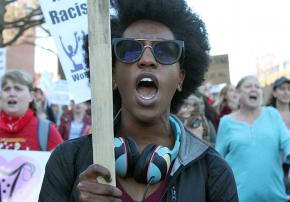Unions are for challenging the privileged
responds to a critique of recent calls for strikes with some truth about what workers' power can accomplish, in an article based on a Facebook comment.
IN THE days before the March 8 International Women's Day strike, and now in the lead-up to May 1, with calls for another day of strikes and protests to challenge Donald Trump's anti-immigrant assault, there have been some strange criticisms heard: That going on strike or even being in a union is a "privilege."
"'A Day Without a Woman' is a strike for privileged protesters" read the headline of one Los Angeles Times column published before March 8, for example. (Organizers and supporters of the March 8 strike call refuted this article here and here).
It's been disappointing and a bit painful to see the belittling of unions and strikes dressed up in language that is associated with the left.
I'm speaking here as the child of two unionized teachers who supported their unions completely, even when they had issues here and there. So yes, I'm biased.
But my defense of unions and strikes also comes from being a socialist and a worker myself, even though I am not a member of a union. With May Day coming up, we need more conversations about why unions and strikes are so essential to our social justice struggles.

Yes, the rates of union membership are so low today that it can be seen as lucky to be a member of a union. But given the use of the term "privilege" today, part of what's being said is that union workers, with their comparatively higher pay and better benefits, are somehow benefitting from lower-paid workers or even complicit in their exploitation.
What's painful here is that this reflects the ideological offensive of the last 40 years of neoliberalism, designed to turn the working class against itself.
Such comments show no knowledge of the struggles and sacrifices that took place to achieve mass unionization in the first place--where strikes of the lowest-paid and most exploited workers often led the way.
The history of the organization of the CIO industrial unions in the 1930s is a history of fighting for all workers' rights, as well as challenging racism and discrimination--whether they came from employers or other unions--and asserting racial solidarity decades before the civil rights movement.
Yes, it's hard to go on strike and hard to decide to give up a paycheck. But if you've ever been involved with a union, or seen one in action during a strike, you know this is exactly the conversation that takes place--or should --when workers are preparing for a struggle: How will we meet the need of our members?
UNIONS ARE the first line of defense against exploitation by the bosses. Unionized workers have generally higher wages and benefits than nonunion workers because it's harder for bosses to force crappy wages and conditions on a collective of workers rather than on individuals.
Of course, unions today are far less radical than in their heyday. Most are dominated by a less-than-accountable leadership, and they are loyal to a Democratic Party that has betrayed them many times. Sometimes, unions take positions that are against the left and social movements--like when the AFL-CIO supported the Dakota Access Pipeline.
So there's a struggle that needs to be waged to make unions more grassroots and oriented around anti-racist and social-justice demands and concerns.
But that doesn't change the importance of unions. Each of us, including those clearly without any privileges, is far better off when we can take on the boss as a collective rather than as individuals. That's why union rights are something that had to be won through struggle, not handed down to us.
The massive protests and strikes on May Day in 2006--with more than 1 million people mobilizing for a "Day Without an Immigrant" to protest draconian anti-immigrant legislation--should have convinced everyone of the connection between organizing workers and social justice.
Finally, the power that organized workers have is like nothing else. Our labor power runs everything. When workers withhold their labor until their demands are met, we can have a far greater impact than, say, organizing a rally of hundreds or blocking a highway for a few hours or holding a sit-in at a university.
That's not to belittle any of these other actions, which are great. I'm involved in them all the time as a faculty member and activist at The Ohio State University.
But strikes and the actions by organized workers can have an impact because those in charge stand to lose large sums of money.
IMAGINE, THEN, if workers demanded not just better contracts for themselves--which we fully deserve--but political measures.
Imagine if we said, in Columbus, that we're not going to work until the police who murdered Henry Green and Tyree King go to trial. We're not working until transgender individuals are free from discrimination in employment, housing and public spaces. No work and no school until OSU scraps the comprehensive energy plan, or cuts its contract with Wendy's, which has blocked fair wages for farmworkers.
We are far away from any of those things taking place. But just to imagine them shows how an organized working class can paly a crucial role in fighting not only for better wages and conditions, but for social justice and the transformation of society. History teaches us that around the world, organized workers have played exactly this role.
We have a right to better wages in this country. We want union rights, and we will organize to make unions democratic, progressive and responsive to the needs of everyone around us, whether they are in the union or not.
An injury to one is an injury to all--that's the tradition of working class solidarity that unions were built on in the U.S., led by socialists and communists and anarchists. It's a perfect slogan for the kind of progressive and social justice-minded unionism we need today.


